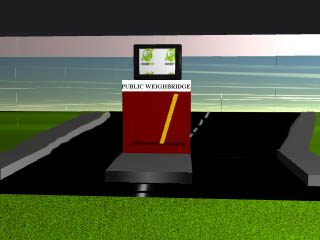
Concept
A central screen asks a series of emotional questions on the topic
of genetics that are designed in such a way as to lead the users around
in circles. To answer a question the users move to the "yes" or "no" side
of a huge set of scales, the heaviest side wins the debate.
Physical interface
The physical interface will be a giant set of scales on which people
can move from one side to the other in order to express their opinion.
A central screen will ask a series of questions and below the screen is
a needle that responds to the weight on the scale by pointing to yes or
no.

Interaction
The screen when not in use will say "weight of public opinion, please
step onto a plate to begin" As soon as a plate is stepped onto the first
question appears on the screen and a 10sec countdown begins to allow people
to move to the plate corresponding to their answer. After 10sec the screen
will say something like "yes" or "no" and move onto the next question.
Some of the questions will be designed so as to expect alternating yes
and no answers and they will attempt to sway public opinion by the manner
in which they are asked. eg We should allowing ge because it will free
us from poverty. (most will answer yes) Then we should not allow ge because
it may destroy the environment (most will answer no). So there will be
different answers to essentially the same questions because of the emotional
nature of them. If in the unlikely event that the weights are the same
the screen could say something like, "who knows?". There will also be more
serious questions asked and at the end of each question statistics will
be shown as to how many people have agreed or disagreed with this groups
answer.
Information provided by exhibit
This exhibit points out the big influence emotion has on public opinion
and therefore on policy making. It also highlights the major ethical issues
involved in ge.